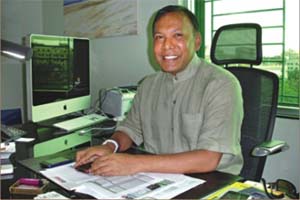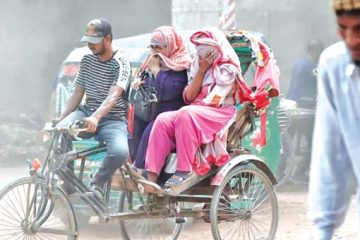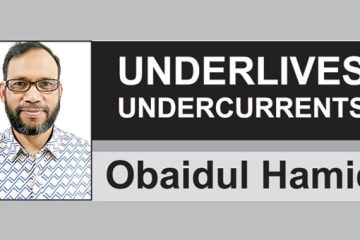Sarwar Ahmed
 As you step out of the lift at the entrance of an outstandingly modern, crisp and clean office, you see an oil painting of a lion and a lamb lazing together. If the painting is a paradox, so is the story of Imdad Haque, a 55-year-old Bangladeshi who locked horns with his future. He has offices sprawling from New York to Moscow, Hamburg, Vienna, Ankara, Dubai, Singapore and recently in Dhaka.
As you step out of the lift at the entrance of an outstandingly modern, crisp and clean office, you see an oil painting of a lion and a lamb lazing together. If the painting is a paradox, so is the story of Imdad Haque, a 55-year-old Bangladeshi who locked horns with his future. He has offices sprawling from New York to Moscow, Hamburg, Vienna, Ankara, Dubai, Singapore and recently in Dhaka.
Since early in life, Imdad was a go-getter, a value instilled in him by his late father. His father was an army personnel, and Imdad helping, were the first to train the youth of Pirojpur where the family comes from, to use firearms as Mukti Bahini in 1971. His father also made it a point that Imdad learn English and encouraged him to listen to English news broadcasts, bought English books to read and got him to learn short-hand and typing. After the Liberation War, these skills and his English helped him to work part-time, contributing to the family of ten siblings and his parents. Imdad recalls his fantastic teachers of Pirojpur Government High School, which he says is the best institution that helped shape his life values.
Imdad went on to BM College in Barisal to complete his HSC. Staying with a family where he had to teach seven children for his bread and board, he attended college and worked part-time, taking dictation, typing our letters, circulars. The executive engineer of Bangladesh Agricultural Development Corporation was kind enough to arrange a flexible time schedule. Imdad was one of the two students who passed with a first division in 1974 from BM College. Dhaka beckoned him for his graduation, and again, his skills helped him to work for UNDP and ILO to pay for his livelihood. A scholarship to the UK fell through as he could not muster the funds required for the travel.
With an indomitable spirit, a small bag with meager belongings and fifty dollars in his pocket he trekked off to Iran. Again his English and typing skills got him various back office jobs. After the tumultuous 1979 revolution in Iran, Imdad left for Vienna, Austria and then on to New York. Completing his graduation in computer science from City University of New York in 1984, he thereafter completed his MBA.
The year 1984 saw the advent of his business, a computer consultancy firm. The first personal computers had just arrived and all around offices needed networks to be established. As his business picked up, he travelled to Poland in 1987 to attend an IT seminar. There he met participants from Kazakhstan who showed interest in his skills of establishing wide area networks. They kept in touch and asked him to participate in a bid for a WAN project for the oil industry in 1989. Bagging the $4 million contract, he completed the project by 1990, linking nineteen oil production region offices.
During his travels to Kazakhstan, Imdad had stopovers in Moscow. He sensed the market for personal computers in 1991 and set up an assembly unit with 114 engineers. Like a bread factory, customers were literally lining up outside the door. Business was brisk as the PCs sold like hot cakes. Imdad was the first to set up a hyper-market in Moscow in 1999, the American model of 24 hours all year round open market, a unique concept in Russia. He gradually increased his footprint with 14 such outlets. As big players like Migros, Carrefour began to come in Russia, nimble footed, he sold off his business in 2007, staying one step ahead before being crushed by the heavy weights.
As part of his business diversification, the next stop was Dubai and Dhaka. He has mixed feelings of investing in Dubai, more so because of the recent property value crash. The power crisis in Bangladesh will take several years to come to a semblance of normality. That is why he has invested in a joint venture with a Turkish company in Bangladesh. Living up to customer commitments, his gensets (fossil-fuel powered generators) are already making their presence felt in a competitive market.
With his supply chain knowledge and links, Imdad bought off a fish processing plant in Rupsa, Khulna. Tearing it apart, he is investing in the best possible equipment and processes to meet international standards to serve European and Russian markets for fish and shrimps.
The purchase of the plant gave him another bonanza, land. Imdad is now investing in what he expects to be one of the largest garment manufacturing units in Bangladesh. With four floors, each with 60,000 square feet, Imdad believes in the best of technologies as he puts in state of the art equipment to produce 100,000 pieces per day. Why Khulna? You are away from the flashpoint of devastating turmoil of Savar and Ashulia, and the nightmarish traffic of Dhaka. There are certainly trained workers of nearby districts who will appreciate to work nearer their homes. And Mongla Port is only half an hour from the site.
What about the recent wage issue? Imdad says our economy is dependent on garments export; we need to be careful of how Bangladesh is being projected in its major markets, the EU and USA. Consumers are questioning about fair play practices. When news about our garment workers being paid 19 euros a month flash, brand buyers are being put in the defensive, as consumers ask if their production sources are using slave labour in sweatshops. If we do not humanise the workplace and pay decent wages, labour unrest will remain a festering sore and can damage Bangladesh’s long-term image.
How does he manage his business? It is quite simple, he says, hire the best of the best. Inculcate a corporate culture of being a family, deal with your associates with respect and never take advantage of your position.
Married to a Russian, they have three children, born in Russia, Finland and Switzerland. Imdad is proud to be a Bangladeshi who loves our luxuriant rural green. He has the satisfaction of having the vision to provide livelihood to thousands and enjoy the challenge of setting up and having fun in running a business in his native Bangladesh.
The writer is the managing director of Syngenta Bangladesh Ltd.







